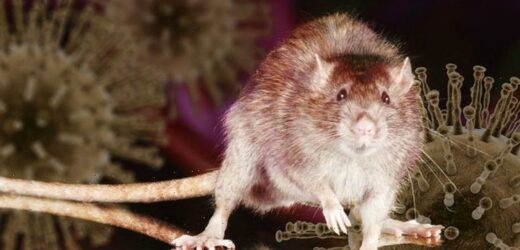Controlling Covid is a 'multi-layered operation' says Dr Pankhania
We use your sign-up to provide content in ways you’ve consented to and to improve our understanding of you. This may include adverts from us and 3rd parties based on our understanding. You can unsubscribe at any time. More info
The tiny rodents, which are estimated to number in the hundreds of millions in the UK, are asymptomatic carriers of coronaviruses. Rats have been responsible for some of the deadliest pandemics in human history, such as the Black Death, and may have, consequently, evolved resistance to various pathogens. According to researchers at Princeton University in New Jersey, US, this makes rats a potential disease vector for future pandemics.
The worrying findings were published in a new study in the journal PLOS Computational Biology.
The paper suggests mice may have also developed a resistance to viral pathogens from ancestral infections.
Professor Mona Singh, the study’s lead author, said: “This raises the possibility that modern rodents may be reservoirs of SARS-like viruses.”
Both the SARS-CoV-2 virus that causes COVID-19 and the SARS-CoV virus behind the 2002 SARS epidemic, belong to the coronavirus family of pathogens.
Coronaviruses are zoonotic, which means they infect humans and animals alike.


These viruses typically cause respiratory and intestinal illnesses and have already caused three epidemics in the last 20 years – SARS in 2002, MERS in 2012, and COVID-19 in 2019.
The SARS-CoV-2 virus is believed to have jumped to humans from infected horseshoe bats in China’s Wuhan City, Hubei Province, in late 2019.
The winged mammals are also suspected of passing the virus onto other species – possibly pangolins.
Much like the rats identified by the Princeton researchers, the bats can carry multiple coronaviruses without falling ill themselves.
According to the researchers, this raises the need to identify and better understand which other species have developed a resistance to viral pathogens.
Last year, for example, scientists studying Uganda’s native bat populations identified a strain of the airborne rubella virus, which is responsible for German measles.
Wuhan lab researchers handle bats in 2017 promo footage
The researchers warned that their findings highlight the dangers of humans encroaching on wild habitats.
Health experts around the globe fear that climate change, globalisation and unchecked urbanisation are fuelling the spread of new diseases.
As more humans come into contact with wild animals, there is a growing risk of previously-unknown viruses and bacteria infecting people.
This was the case with SARS in 2002, which has also been linked to horseshoe bats as well as masked palm civets.
Another prime example of a deadly virus that has jumped from animals to humans is the Zaire ebolavirus that causes Ebola.


The virus has been linked to African fruit bats, chimpanzees, gorillas and forest antelopes.
Together with graduate student Sean King, Professor Singh performed an evolutionary analysis of the protein spikes used by SARS viruses to infect their hosts.
Also known as ACE2 receptors, the protein spikes hook onto the surface of mammal cells and provide an entry point.
The analysis found SARS-like infections have not been evolutionary drivers in the history of primates.
However, some species of rodents were found to have been repeatedly exposed.
Professor Singh said: “Our study suggests ancestral rodents may have had repeated infections with SARS-like coronaviruses.
“They have acquired some form of tolerance or resistance to SARS-like coronaviruses as a result of these infections.
“This raises the tantalising possibility some modern rodent species may be asymptomatic carriers of SARS-like coronaviruses – including those that may not have been discovered yet.”
Earlier this year, the UK’s top scientific advisers at SAGE found that coronaviruses could be transmitted by rats.
However, the Department for Environment, Food and Rural Affairs (DEFRA) assured that the risk of people being infected is “very low” unless they work near the rodents.
DEFRA researchers also claimed rats can catch the virus from humans, in particular the Kent and South African variants.
Source: Read Full Article


